Related Research Articles
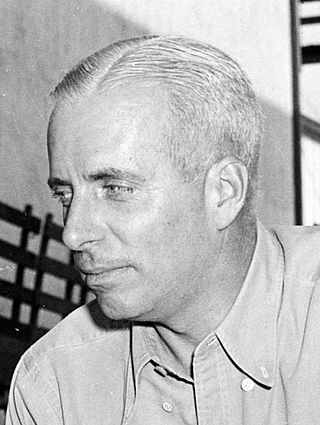
Howard Winchester Hawks was an American film director, producer and screenwriter of the classic Hollywood era. Critic Leonard Maltin called him "the greatest American director who is not a household name." Roger Ebert called Hawks "one of the greatest American directors of pure movies, and a hero of auteur critics because he found his own laconic values in so many different kinds of genre material."

James Maitland "Jimmy" Stewart was an American actor. Known for his distinctive drawl and everyman screen persona, Stewart's film career spanned 80 films from 1935 to 1991. With the strong morality he portrayed both on and off the screen, he epitomized the "American ideal" in the mid-twentieth century. In 1999, the American Film Institute (AFI) ranked him third on its list of the greatest American male actors. He received numerous honors including the Screen Actors Guild Life Achievement Award in 1968, the AFI Life Achievement Award in 1980, the Kennedy Center Honor in 1983, as well as the Academy Honorary Award, and Presidential Medal of Freedom, both in 1985.

Steven Allan Spielberg is an American film director, writer and producer. A major figure of the New Hollywood era and pioneer of the modern blockbuster, he is the most commercially successful director of all time. He is the recipient of various accolades, including three Academy Awards, two BAFTA Awards, and four Directors Guild of America Awards, as well as the AFI Life Achievement Award in 1995, the Kennedy Center Honor in 2006, the Cecil B. DeMille Award in 2009 and the Presidential Medal of Freedom in 2015. Seven of his films have been inducted into the National Film Registry by the Library of Congress as "culturally, historically or aesthetically significant".

The Silence of the Lambs is a 1991 American psychological horror film directed by Jonathan Demme and written by Ted Tally, adapted from Thomas Harris's 1988 novel. It stars Jodie Foster as Clarice Starling, a young FBI trainee who is hunting a serial killer named "Buffalo Bill", who skins his female victims. To catch him, she seeks the advice of the imprisoned Dr. Hannibal Lecter, a brilliant psychiatrist and cannibalistic serial killer. The film also features performances from Scott Glenn, Anthony Heald, and Kasi Lemmons.

Night of the Living Dead is a 1968 American independent horror film directed, photographed, and edited by George A. Romero, with a screenplay by John Russo and Romero, and starring Duane Jones and Judith O'Dea. The story follows seven people who are trapped in a rural farmhouse in western Pennsylvania, which is under assault by an enlarging group of flesh-eating, undead ghouls.

Cary Grant was an English-American actor. He was known for his Mid-Atlantic accent, debonair demeanor, light-hearted approach to acting, and sense of comic timing. He was one of classic Hollywood's definitive leading men from the 1930s until the mid-1960s. He was nominated twice for the Academy Award for Best Actor, and in 1970 he was presented an Academy Honorary Award by his friend Frank Sinatra at the 42nd Academy Awards. He was accorded the Kennedy Center Honors in 1981. In 1999, the American Film Institute named him the second greatest male star of Golden Age Hollywood cinema, trailing only Humphrey Bogart.

Clinton Eastwood Jr. is an American actor and film director. After achieving success in the Western TV series Rawhide, he rose to international fame with his role as the "Man with No Name" in Sergio Leone's "Dollars Trilogy" of Spaghetti Westerns during the mid-1960s and as antihero cop Harry Callahan in the five Dirty Harry films throughout the 1970s and 1980s. These roles, among others, have made Eastwood an enduring cultural icon of masculinity. Elected in 1986, Eastwood served for two years as the mayor of Carmel-by-the-Sea, California.
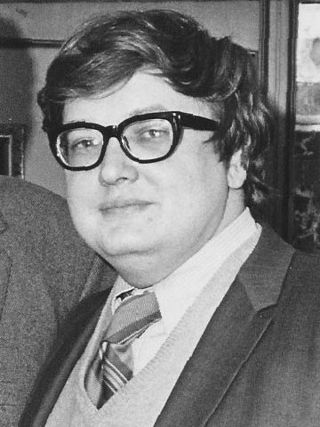
Roger Joseph Ebert was an American film critic, film historian, journalist, screenwriter, and author. He was a film critic for the Chicago Sun-Times from 1967 until his death in 2013. In 1975, Ebert became the first film critic to win the Pulitzer Prize for Criticism. Neil Steinberg of the Chicago Sun-Times said Ebert "was without question the nation's most prominent and influential film critic," and Kenneth Turan of the Los Angeles Times called him "the best-known film critic in America."

Greta Garbo was a Swedish-American actress. Regarded as one of the greatest screen actresses, she was known for her melancholic, somber persona, her film portrayals of tragic characters, and her subtle and understated performances. In 1999, the American Film Institute ranked Garbo fifth on its list of the greatest female stars of classic Hollywood cinema.
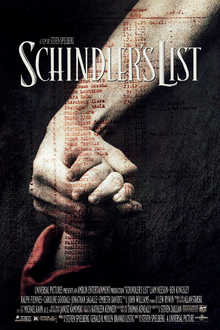
Schindler's List is a 1993 American epic historical drama film directed and produced by Steven Spielberg and written by Steven Zaillian. It is based on the 1982 novel Schindler's Ark by Australian novelist Thomas Keneally. The film follows Oskar Schindler, a German industrialist who saved more than a thousand mostly Polish-Jewish refugees from the Holocaust by employing them in his factories during World War II. It stars Liam Neeson as Schindler, Ralph Fiennes as SS officer Amon Göth, and Ben Kingsley as Schindler's Jewish accountant Itzhak Stern.

Elizabeth Ruth Grable was an American actress, pin-up girl, dancer, model, and singer.
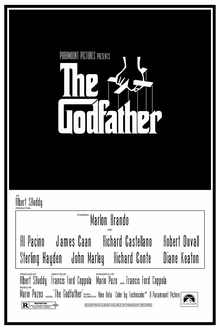
The Godfather is a 1972 American crime film directed by Francis Ford Coppola, who co-wrote the screenplay with Mario Puzo, based on Puzo's best-selling 1969 novel of the same title. The film stars Marlon Brando, Al Pacino, James Caan, Richard Castellano, Robert Duvall, Sterling Hayden, John Marley, Richard Conte, and Diane Keaton. It is the first installment in The Godfather trilogy, chronicling the Corleone family under patriarch Vito Corleone (Brando) from 1945 to 1955. It focuses on the transformation of his youngest son, Michael Corleone (Pacino), from reluctant family outsider to ruthless mafia boss.
Armond White is an American film and music critic who writes for National Review and Out. He was previously the editor of CityArts (2011–2014), the lead film critic for the alternative weekly New York Press (1997–2011), and the arts editor and critic for The City Sun (1984–1996). Other publications that have carried his work include Film Comment, Variety, The Nation, The New York Times, Slate, Columbia Journalism Review, and First Things.

James Lewis Hoberman is an American film critic, journalist, author and academic. He began working at The Village Voice in the 1970s, became a full-time staff writer in 1983, and was the newspaper's senior film critic from 1988 to 2012.
Sleep is a 1964 American avant-garde film by Andy Warhol. Lasting five hours and 20 minutes, it consists of looped footage of John Giorno, Warhol's lover at the time, sleeping.
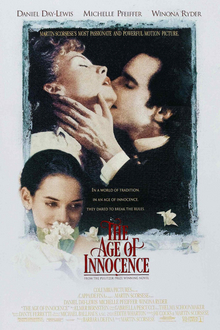
The Age of Innocence is a 1993 American historical romantic drama film directed by Martin Scorsese. The screenplay, an adaptation of the 1920 novel The Age of Innocence by Edith Wharton, was written by Scorsese and Jay Cocks. The film stars Daniel Day-Lewis, Michelle Pfeiffer, Winona Ryder and Miriam Margolyes, and was released by Columbia Pictures. The film recounts the courtship and marriage of Newland Archer (Day-Lewis), a wealthy New York society attorney, to May Welland (Ryder); Archer then encounters and legally represents Countess Olenska (Pfeiffer) prior to unexpected romantic entanglements.
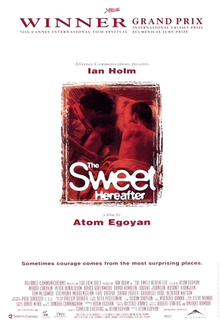
The Sweet Hereafter is a 1997 Canadian drama film written and directed by Atom Egoyan, adapted from the 1991 novel by Russell Banks. It tells the story of a school bus accident in a small town that kills 14 children. A class-action lawsuit ensues, proving divisive in the community and becoming tied with personal and family issues. It stars an ensemble cast featuring Ian Holm, Sarah Polley, Maury Chaykin, Bruce Greenwood, Tom McCamus, Gabrielle Rose, Arsinée Khanjian and Alberta Watson.

Halloween is a 1978 American independent slasher film directed and scored by John Carpenter, co-written with producer Debra Hill, and starring Jamie Lee Curtis and Donald Pleasence, with P. J. Soles and Nancy Loomis in supporting roles. The plot centers on a mental patient, Michael Myers, who was committed to a sanitarium for murdering his babysitting teenage sister on Halloween night when he was six years old. Fifteen years later, he escapes and returns to his hometown, where he stalks a female babysitter and her friends while under pursuit by his psychiatrist.
The white savior is a cinematic trope in which a white central character rescues non-white characters from unfortunate circumstances. This recurs in an array of genres in American cinema, wherein a white protagonist is portrayed as a messianic figure who often gains some insight or introspection in the course of rescuing non-white characters from their plight.

Jane Wodening is an American artist and writer. She is best known for her collaborations with experimental filmmaker Stan Brakhage, to whom she was married from 1957 until 1987. During this period, she was known as Jane Brakhage. Wodening featured in Brakhage's short film Window Water Baby Moving, in which her husband filmed her giving birth.
References
- ↑ "Archer Winsten, 92, Movie Reviewer at The Post, Dies" . Retrieved July 4, 2021.
- ↑ "Archer Winsten" . Retrieved July 4, 2021.
- ↑ "The Critics' Corner on WUTHERING HEIGHTS". Turner Classic Movies.
- ↑ Dmytryk, Edward (1996). Odd Man Out: A Memoir of the Hollywood Ten. Carbondale, Illinois: Southern Illinois University Press. p. 32. ISBN 978-0809319985.
- ↑ Lyons, Charles (1997). The New Censors: Movies and the Culture Wars. Philadelphia: Temple University Press. p. 73. ISBN 978-1566395113.